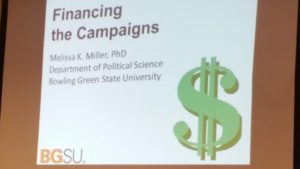By JAN LARSON McLAUGHLIN
BG Independent News
As results were streaming in from Super Tuesday, a group of people in Bowling Green debated whether or not money can buy elections. The answer: Maybe.
They also discussed whether or not reform is needed in campaign financing. The answer: Definitely.
Dr. Melissa Miller, an expert in American politics from Bowling Green State University, spoke to the Bowling Green League of Women Voters Tuesday evening about “Money in Politics.”
She tackled Senate races firsts, noting the average Senate incumbent spends $10 million to hold onto his or her seat. That’s a lot for a job that pays $174,000 a year. Spread out over the six-year term, that means the incumbent spent $4,700 for each day in office.
The big spending adds up to a huge advantage for incumbents, a lot of intimidation for competitors, and a lot of time focused on fundraising.
“It’s not time spent on legislation, in committee meetings, or listening to constituents,” Miller said.
The big money results in a 90 percent re-election rate in the U.S. House.
“You can’t possibly win” without raising vast sums. Yet, “it becomes difficult to convince donors that you have a shot.” This, Miller said, is the “vicious circle of campaign finance.”
Both Democrats and Republicans spin that circle. “It’s a problem that’s been created by both parties,” she said.

To better explain campaign finance of today, Miller gave a history lesson on the issue. Prior to 1970, there was little transparency in how campaigns were funded. Companies and unions were banned from giving, but individuals could donate unlimited amounts. “Fat cats had a lot of influence.”
The process became more transparent in the 1970s. “Something called Watergate happened to change the system,” she said. “Let me remind you, this was a campaign finance scandal.”
The result was more transparency and reduced impact by big donors. “The public was demanding action on this.”
So in 1974, donations from individuals were limited to $1,000, labor unions could give up to $5,000, and campaigns had to disclose the names of anyone giving more than $200.
“The influence of the big donors was really curbed,” she said.
Then in 1976, it was ruled that contributions were protected by the First Amendment. And in 1979, the “soft money loophole” went into effect allowing parties to raise unlimited money for “party building,” not for a particular candidate.
The Bipartisan Campaign Reform Act of 2002 banned the soft money and raised contribution limits. “It turned off that soft money spigot.”
But it didn’t take either party long to find out how to make that change work in their favor, Miller said. Since then, the spending on presidential campaigns has skyrocketed, and the last candidate to accept the limitations for public funding was John McCain in 2008.
“Mark my words, no one will accept it in 2016,” Miller said.
The spigot for funding was opened even wider in 2010 with the Supreme Court’s decision for Citizens United. The ruling restored secrecy and allowed creation of Super PACs, which differ from regular PACs. With Super PACs, contributions from individuals are not limited.
“Big donors can give as much as they want,” Miller said.
Super PACs are not allowed to coordinate directly with specific campaigns, but they get around that by being led by friends or associates of the candidates, she said.
In 2012, 66.5 percent of Super PAC money went to GOP campaigns, according to Miller.
After the history lesson, came the big question.
“Does money buy elections in this country?” she asked. Well, yes and no. “For every example is a counter-example.”
Take Jeb Bush, whose presidential campaign fizzled out rather quickly. “He outraised everybody,” Miller said, noting that Bush had $124 million in Super PAC money.
The next question: Who’s giving the money to Super PACs. The answer, very few people are giving an awful lot of money. Almost two-thirds of the dollars come from 0.4 percent of the nation’s population.
So if money can’t always buy an election, can it at least get you in the door? “It’s very difficult to prove,” Miller said. But a study showed that Congress members were much more likely to meet with people if they were referred to as “local campaign donors” than if they were referred to as “local constituents.”
Is it too late to get control of the gushing money spigot?
“It’s big. It’s problematic,” she said. “I think a lot of us are interested in reforms.”
Miller’s audience had suggestions, like requiring shorter campaign seasons such as Great Britain’s six-week limit. They suggested transparency for donors to Super PACs, requiring donors to be registered voters in the district of the candidate, or free TV time for candidates.
“The problem is our First Amendment,” Miller said. “It’s very quick that you bump into the First Amendment when you try reform.”
Campaign finance is a huge issue this year, with candidates like Bernie Sanders who shuns Super PACs and Donald Trump who has been financing his own campaign.
“This is an issue that’s being talked about on both sides, and that’s a good thing,” Miller said.
League of Women Voters members also voiced concern Tuesday evening about the negative campaigning by candidates. Miller agreed and said voters seem to be ignoring candidate qualifications. “The voters couldn’t care less.”
She shared concerns about the opening of Pandora’s box by candidates taking their campaigns to the gutter. “The level of uncivility is higher than any of us has seen, and I don’t think you can close that box.”

